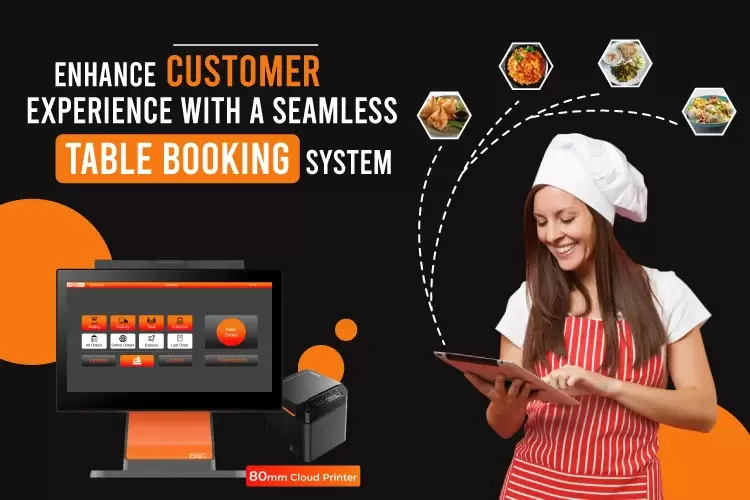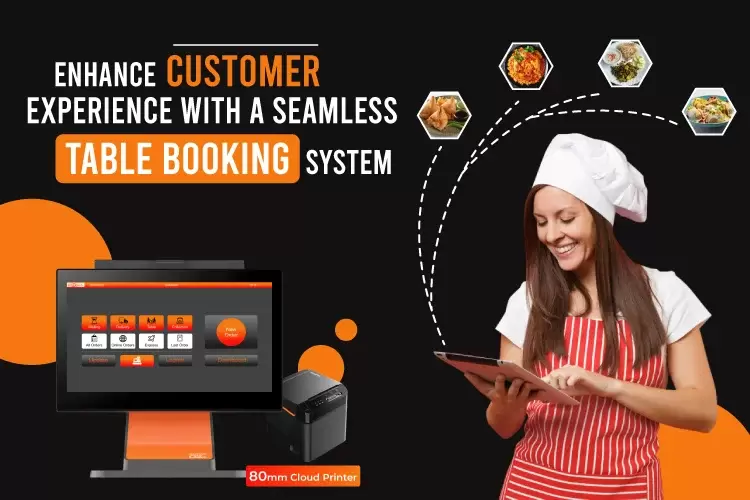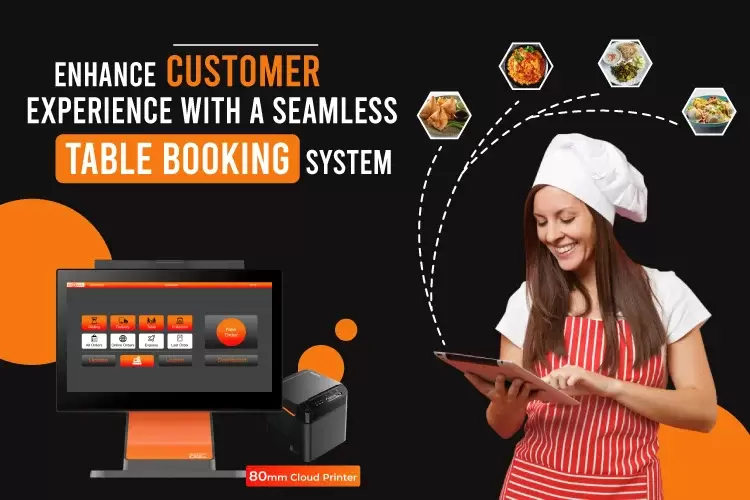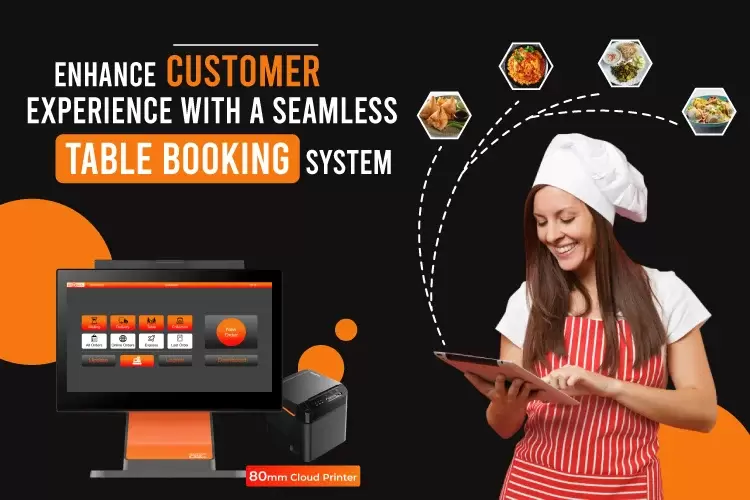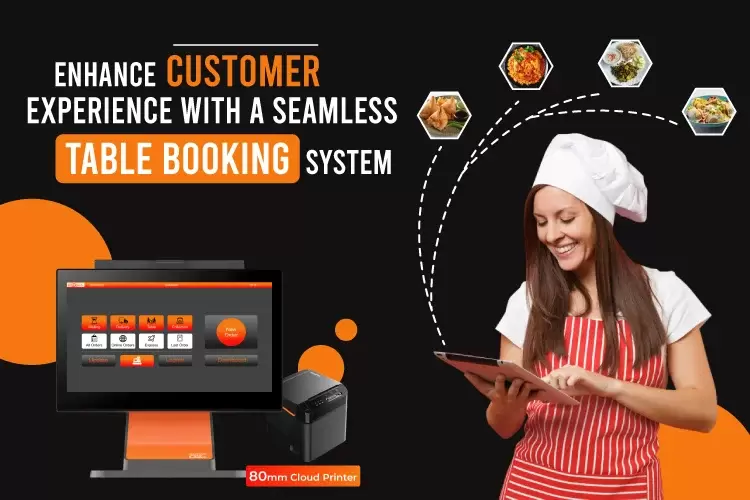
Enhance Customer Experience with a Seamless Table Booking System
Streamline Your Restaurant Operations with an Efficient Table Booking System
In the competitive restaurant industry, providing an exceptional dining experience goes beyond great food and service. Customers expect convenience, and one of the most important aspects of that is a table booking system that allows them to easily make reservations. Whether it's a fine dining restaurant, a casual eatery, or a hotel restaurant, a reservation management software or online table booking system can transform how you manage your restaurant’s seating and enhance the customer experience.
Let’s explore how implementing a restaurant reservation system can streamline your operations, reduce no-shows, and provide better service to your guests.
Why Your Restaurant Needs a Table Booking System
-
Improved Customer Convenience: With an efficient table booking system, your customers can make reservations anytime, from anywhere. Whether it’s via your website, a mobile app, or a third-party platform, your customers can view available times, book a table, and even receive confirmation emails or SMS. Offering online reservations for restaurants ensures that customers have a smooth, hassle-free experience when planning their visit.
-
Reduced No-Shows and Overbookings: One of the biggest headaches for restaurant owners is dealing with no-shows and overbookings. A reservation system for restaurants helps mitigate these issues by allowing customers to confirm or cancel their bookings with ease. Many systems even send reminders to guests ahead of time, encouraging them to show up for their reservation or cancel if plans change. This reduces empty tables and helps maximize your seating capacity.
-
Efficient Table Management: A table management system is an integral part of a modern restaurant booking system. It allows you to manage reservations and seatings more effectively, ensuring that tables are allocated according to customer preferences, dining times, and group sizes. This is especially useful during peak hours or special events. A restaurant booking software lets your staff quickly see which tables are available, ensuring smoother service and minimizing wait times for your customers.
-
Real-Time Availability and Instant Confirmation: With an online table booking system, customers can instantly see your restaurant’s availability in real-time. This eliminates the need for back-and-forth communication, such as phone calls or emails, and gives guests immediate confirmation of their reservation. Offering real-time table booking enhances the customer experience by reducing frustration and providing them with the certainty of their reservation.
-
Increase Revenue with Optimized Seating: By using a table booking software, you can optimize your seating arrangements and manage your dining flow more efficiently. You can easily create different booking time slots, allowing you to serve more customers without overcrowding. Additionally, with insights from your restaurant reservation platform, you can identify peak booking times and make strategic adjustments to ensure maximum revenue generation.
-
Customizable and Flexible Booking Options: The flexibility offered by online booking systems enables customers to select their preferred dining times, request specific seating arrangements, and even provide special instructions for their visit. This personalization creates a more tailored experience and increases customer satisfaction. Furthermore, many reservation systems for hotels or restaurants allow you to create multiple booking types, such as group reservations, private dining requests, and event bookings, offering your customers more options to meet their needs.
-
Customer Insights and Data Analytics: A powerful table booking system doesn’t just help manage reservations—it also provides valuable customer insights. By tracking reservations and analyzing customer behaviors, you can gain a deeper understanding of which days and times are most popular, which menu items guests order most frequently, and how often they return. This data allows you to optimize your marketing efforts, personalize offers, and refine your menu to better meet customer demands.
Features to Look for in a Table Booking System
-
Mobile and Web Access: Make sure your table reservation system is mobile-friendly. Customers increasingly prefer to book from their smartphones, so having a mobile booking system is essential for maximizing bookings. Look for a system that’s easy to navigate on both desktop and mobile devices, giving your customers the flexibility to make reservations on the go.
-
Integration with POS and EPOS Systems: For a seamless experience, your table management system should integrate with your POS or EPOS system. This ensures that your front-of-house team has access to real-time data on table availability, orders, and payments. It also allows for smoother service and enables the tracking of revenue and guest preferences, giving you a comprehensive overview of operations.
-
Customizable Confirmation and Reminder Alerts: Setting up automatic confirmation emails or SMS messages after a reservation is made helps ensure that customers are aware of their booking. You can also set reminder notifications, reducing the likelihood of no-shows. Customizable messaging options also allow you to communicate special offers or reminders to customers before they arrive at your restaurant.
-
Guest Preferences and Notes: Many table reservation software options allow you to note customer preferences and special requests. Whether it’s a birthday celebration, a specific dietary requirement, or a preferred seating area, the system can help ensure that guests receive personalized attention, making them feel valued and more likely to return.
-
Waitlist Management: On busy nights, it’s crucial to manage waiting lists effectively. Some online table booking systems allow you to create a waitlist for customers when your restaurant is fully booked. When a table becomes available, you can notify guests on the waitlist and instantly confirm their reservation.
-
Integrated Payment Options: Offering an integrated payment option through your restaurant reservation system allows customers to prepay or make deposits for their reservations, reducing the chances of no-shows and ensuring smoother operations. For restaurants offering special events or prix fixe menus, a payment gateway integration ensures that you’re paid in advance, securing both the customer and the restaurant.
-
Multi-Location Support: If you run multiple locations, look for a restaurant reservation platform that allows you to manage bookings across various branches from a single dashboard. This simplifies your operations and makes it easier to track guest data, bookings, and preferences, whether customers are dining at your main location or one of your satellite restaurants.
How a Table Booking System Benefits Your Business
-
Streamline Operations: The most obvious benefit of a restaurant booking system is the increased operational efficiency. By automating your booking process, you free up your staff from having to take reservations manually over the phone. This allows your team to focus on providing a better dining experience for guests, rather than managing a complex reservation list.
-
Enhance Customer Satisfaction: An intuitive and easy-to-use table reservation system makes booking a table a pleasant experience for customers. When your customers can easily secure a reservation at a time that suits them, they are more likely to feel valued and satisfied, which leads to positive reviews and repeat business.
-
Boost Marketing Opportunities: A table booking system offers excellent opportunities for targeted marketing. By having access to customer data such as dining history and preferences, you can send tailored promotional offers to guests, keeping them engaged with your restaurant. Additionally, a well-executed reservation management software can help you track seasonal trends and optimize your marketing campaigns.
-
Optimized Seating Capacity: Maximizing your seating capacity is essential for running a profitable restaurant. By managing bookings through an integrated table management system, you can ensure that tables are used effectively without overbooking. With the ability to adjust booking times and optimize seating arrangements, your restaurant can serve more guests while maintaining high service standards.
Conclusion
A table booking system is no longer just a luxury for restaurants—it’s an essential tool for modern-day operations. Whether you're running a small bistro or a large hotel restaurant, implementing an efficient reservation system for restaurants will improve customer convenience, reduce no-shows, optimize seating arrangements, and help boost your revenue.
Investing in a restaurant booking software with features like mobile access, real-time availability, and integration with POS systems will allow you to manage your restaurant’s reservations smoothly and provide an exceptional experience for your guests. From personalized services to customer insights, a table booking system will help your restaurant thrive in an increasingly competitive market.
So, make the smart choice today, and enhance both your customers' experience and your restaurant's operational efficiency with a top-tier online booking system.
Leave a Reply
Your email address will not be published.
